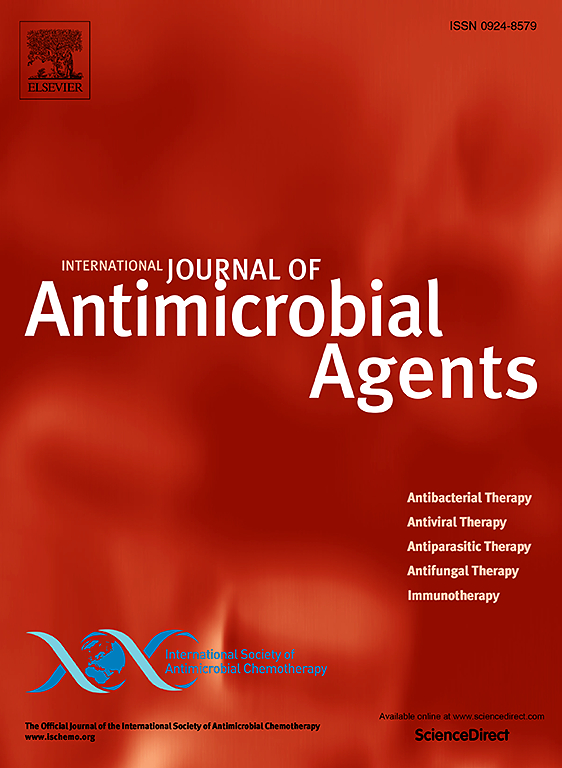Procalcitonin-guided early cessation of antibiotics prevents gut inflammation and preserves gut microbiome: Data from the PROGRESS controlled trial
IF 4.6
2区 医学
Q1 INFECTIOUS DISEASES
International Journal of Antimicrobial Agents
Pub Date : 2025-04-09
DOI:10.1016/j.ijantimicag.2025.107507
引用次数: 0
Abstract
The PROGRESS randomised trial (ClinicalTrials.gov: NCT03333304) showed that early stopof antibiotics guided by procalcitonin (PCT) decreased the incidence of infections by multidrug-resistant organisms and/or Clostridioides difficile and was associated with survival benefit. This study was conducted to investigate whether this survival benefit is associated with microbiome dysbiosis. Patients with sepsis due to lung infection, acute pyelonephritis or primary bacteraemia were randomised to standard-of-care (SoC) duration of antibiotics or early stop using PCT. Faecal samples were collected before, and 7 and 28 days after randomisation and analysed using 16S rRNA Nanopore sequencing. Calprotectin was measured using an enzyme immunoassay. Median (Q1-Q3) antimicrobial duration was 5 (5-7.5) days in the PCT arm and 11 (8-15) days in the SoC arm (P < 0.001). Faecal calprotectin levels were similar in the two treatment arms at baseline. By day 7, the levels of faecal calprotectin were significantly increased in the SoC arm (P = 0.002) but were unchanged in the PCT arm. Microbiome α- and β-diversity was similar at baseline in the PCT (n=81) and SoC (n=76) treatment arms. Shannon’s index was significantly lower in the SoC arm on day 7 compared with baseline (median [Q1-Q3], 2.88 [2.37-3.39] at day 1 vs. 2.24 [1.52-3.08] at day 7; Pt-test = 0.0013). This was not the case for the PCT arm (median [Q1-Q3], 2.73 [2.26-3.4] at day 1 vs. 2.43 [1.81-3.21] at day 7; Pt-test = 0.037, Bonferroni corrected α = 0.0125). The relative abundance of Actinomycetota and Pseudomonadota was decreased in the PCT arm by day 7 and that of Bacillota was increased. Early PCT-guided stop of antibiotics contributes to decreased microbiome dysbiosis by day 7.

降钙素原引导的早期停用抗生素可预防肠道炎症并保护肠道微生物群:来自PROGRESS对照试验的数据
PROGRESS随机试验(ClinicalTrials.gov: NCT03333304)显示,在降钙素原(PCT)指导下早期停用抗生素可降低多药耐药菌和/或艰难梭菌感染的发生率,并与生存获益相关。这项研究是为了调查这种生存益处是否与微生物群失调有关。因肺部感染、急性肾盂肾炎或原发性菌血症引起的脓毒症患者被随机分配到抗生素的标准治疗(SoC)持续时间或早期停止使用PCT,随机化前、随机化后7天和28天收集粪便样本,并使用16S rRNA纳米孔测序进行分析。用酶免疫分析法测定钙护蛋白。中位(Q1-Q3)抗菌持续时间PCT组为5(5-7.5)天,SoC组为11(8-15)天(P <;0.001)。两个治疗组的粪便钙保护蛋白水平在基线时相似。到第7天,SoC组的粪便钙保护蛋白水平显著升高(P = 0.002),但PCT组没有变化。PCT组(n=81)和SoC组(n=76)的微生物组α-和β-多样性在基线时相似。与基线相比,SoC组的Shannon指数在第7天显著降低(第1天的中位数[Q1-Q3]为2.88[2.37-3.39],第7天为2.24 [1.52-3.08];pt检验= 0.0013)。PCT组的情况并非如此(第1天的中位数[Q1-Q3]为2.73[2.26-3.4],第7天为2.43 [1.81-3.21];pt检验= 0.037,Bonferroni校正α = 0.0125)。PCT组放线菌门和假单胞菌门的相对丰度在第7天下降,杆菌门的相对丰度增加。在pct引导下,早期停用抗生素有助于在第7天减少微生物群失调。
本文章由计算机程序翻译,如有差异,请以英文原文为准。
求助全文
约1分钟内获得全文
求助全文
来源期刊
CiteScore
21.60
自引率
0.90%
发文量
176
审稿时长
36 days
期刊介绍:
The International Journal of Antimicrobial Agents is a peer-reviewed publication offering comprehensive and current reference information on the physical, pharmacological, in vitro, and clinical properties of individual antimicrobial agents, covering antiviral, antiparasitic, antibacterial, and antifungal agents. The journal not only communicates new trends and developments through authoritative review articles but also addresses the critical issue of antimicrobial resistance, both in hospital and community settings. Published content includes solicited reviews by leading experts and high-quality original research papers in the specified fields.

 求助内容:
求助内容: 应助结果提醒方式:
应助结果提醒方式:


